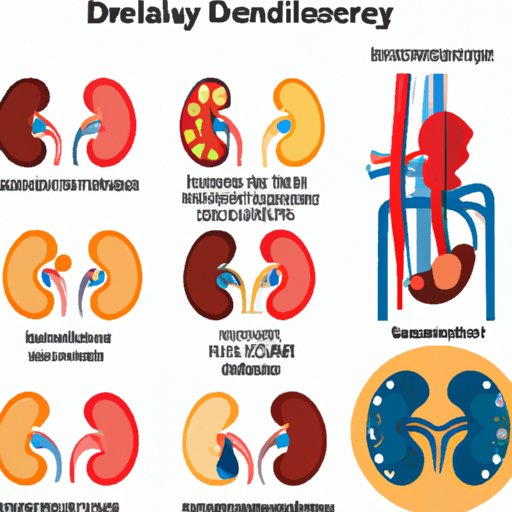
I. Introduction
Renal diseases, also known as kidney diseases, affect millions of people around the world. This condition is characterized by the failure of the kidneys to perform their normal functions, leading to a buildup of toxic substances in the body. If left untreated, renal diseases can be life-threatening and cause long-term health complications. The purpose of this article is to provide readers with a comprehensive guide to understanding renal diseases, including their causes, symptoms, and treatment options.
II. Understanding Renal Diseases: A Comprehensive Guide to Renal Failure, Its Causes, and Symptoms
Renal failure occurs when the kidneys are no longer able to remove waste and excess fluids from the body. This can be caused by a variety of factors, including high blood pressure, diabetes, and autoimmune disorders. Symptoms of renal failure may include fatigue, nausea, decreased appetite, and swelling in the legs and feet. Renal failure can be categorized into different stages, with each stage representing a different level of severity.
III. The Silent Killer: How Renal Diseases Affect Your Body and What You Can Do About It
Renal diseases can have a significant impact on the body, affecting various organs and systems. If left untreated, renal diseases can lead to long-term health complications such as heart disease, anemia, and nerve damage. Prevention is key in minimizing the risk of renal diseases, and proactive measures such as maintaining a healthy weight, exercising regularly, and managing blood pressure and blood sugar levels can help reduce the risk of developing renal diseases.
IV. Kidney Health 101: Everything You Need to Know About Renal Diseases
The kidneys play a vital role in maintaining overall health, regulating fluid balance, and removing waste and excess fluids from the body. There are various types of renal diseases, including chronic kidney disease, kidney stones, and kidney infections. These conditions can be caused by a range of factors, including genetics, medication use, and autoimmune disorders. Early diagnosis and treatment are essential in managing renal diseases and minimizing potential complications. Diagnostic tests may include blood and urine tests, imaging tests, or a kidney biopsy.
V. Renal Diseases: A Closer Look at the Types, Symptoms, and Treatment Options
The symptoms of renal diseases can vary depending on the type and severity of the condition. Chronic kidney disease, for example, may initially present with no symptoms, while acute kidney injury may cause sudden and severe symptoms. Treatment options for renal diseases may include medication, dialysis, or kidney transplant. The choice of treatment will depend on the underlying cause and severity of the condition.
VI. Managing Renal Diseases: Tips, Treatment, and Strategies to Live a Healthy Life with Kidney Disease
Lifestyle changes can play an important role in managing renal diseases, including maintaining a healthy diet, limiting salt intake, and avoiding tobacco and alcohol. Treatment options may include medications such as angiotensin-converting enzyme (ACE) inhibitors or angiotensin receptor blockers (ARBs), which can help manage blood pressure and delay the progression of renal disease. In some cases, dialysis may be necessary to remove excess fluid and waste from the body.
VII. Living with Renal Diseases: Personal Stories and Expert Advice on Coping with Kidney Conditions
Individuals with renal diseases may face various challenges, including the need for dialysis, frequent doctor visits, and managing medications and lifestyle changes. Personal stories from individuals living with renal diseases can provide valuable insight into coping with the condition and navigating the healthcare system. Expert advice from healthcare providers can also offer guidance on managing symptoms and improving overall quality of life. Resources and support groups are available for individuals with renal diseases and their families.
VIII. Conclusion
Renal diseases are a significant health concern, affecting millions of people worldwide. Early detection and treatment are essential in managing renal diseases and minimizing potential complications. Understanding the causes, symptoms, and treatment options of renal diseases can help individuals take proactive measures to maintain kidney health and improve overall quality of life. If you suspect you have kidney disease, it is important to seek medical help and talk to your healthcare provider about developing a personalized treatment plan.





